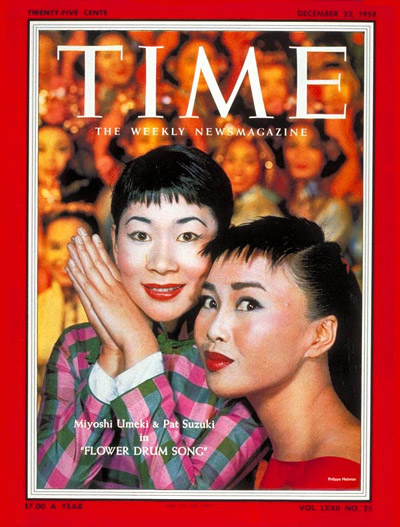


Guardian obituary in 2007
Although there had been a number of leading Asian actors in the US before Miyoshi Umeki, who has died aged 78, she was the first to win an Oscar and to make an impact in films, on stage and on television.
Umeki’s Academy award was for best supporting actress in the 1957 movie Sayonara, as a Japanese woman who marries an American soldier, played by Red Buttons, who won the best supporting actor category. The US military does everything it can to break up the marriage, finally forcing the couple to commit suicide rather than face being separated by his transfer.
The 5ft 1in tall Umeki gave such a tender performance that she overcame the submissive nature of the role. Likewise, her personality, wit and charming singing overrode much of the patronising attitude of the Rogers and Hammerstein Broadway musical Flower Drum Song (1958), in which she appeared on both stage and screen.
According to Time magazine, which featured Umeki and her co-star Pat Suzuki on the cover: “When Miyoshi Umeki glides on stage to star in her first Broadway show, her first four words capture the house. The warmth of her art works a kind of tranquil magic, and the whole theatre relaxes.”
Born in the northern Japanese island of Hokkaido, Umeki was the youngest of nine children, whose father owned a successful iron factory. She was first exposed to US popular music as a teenager by a group of GIs who befriended her family shortly after VJ day in August 1945. While listening to Armed Forces Radio, she started to sing by imitating Dinah Shore, Peggy Lee and Doris Day, learning the words of the songs phonetically. She soon found her own voice, singing on Japanese radio and television, and recording for RCA Japan under the name of Nancy Umeki.
Two years after appearing in one Japanese film, a musical called Seishun Jazu Musume (Youthful Jazz Daughter, 1953), she went to the US to play the nightclub circuit. Her appearance on the Arthur Godfrey and Friends TV show on television in 1955 was noticed by a Warner Bros casting agent, who got her to make a screen test for Joshua Logan, the director of Sayonara.
Like many Oscar winners before and after her, Umeki was almost lost for words at the awards ceremony. She could only say: “I wish somebody would help me right now. I didn’t expect it and have nothing in my mind. Except I want to thank you and you and you and all American people.”
Umeki and a few other Japanese actors had begun to profit from America’s rapprochement with its erstwhile enemy, and such Japanese films as Akira Kurosawa’s Rashomon (1950) were beginning to be more widely shown, although there was still a long way to go to overcome stereotyping.
Flower Drum Song, directed by Gene Kelly and featuring a mostly Asian cast, had the Japanese Umeki playing an illegal Chinese immigrant just arrived in San Francisco for an arranged marriage – Broadway and Hollywood seldom bothered to make ethnic distinctions. Her two solo numbers, A Hundred Million Miracles and I’m Going To Like It Here, were sweetly sung both on stage and in the 1961 film version, but the character was not much of an advance from the days of Anna May Wong.
Umeki’s other Hollywood movies, all feeble attempts to dispute that “never the twain shall meet”, were Cry For Happy (1961), in which she played one of four geisha girls – all smiles and gestures – entertaining four American naval photographers on leave in Tokyo; The Horizontal Lieutenant (1962) – smiling and inscrutable while watching Jim Hutton’s antics as an American serviceman on a Pacific island; and A Girl Named Tamiko (1962), in which she was living with British antique dealer Michael Wilding.
Umeki found rather more rewarding work on television, especially in 66 episodes, between 1969 and 1972, of The Courtship of Eddie’s Father. The show centered around Bill Bixby as a youngish widower whose freckled-faced, six-year-old son, Eddie (Brandon Cruz), tries to manipulate his father into getting a new wife. Umeki played the sage Japanese housekeeper, Mrs Livingston, always called by her last name, while she calls her boss “Mr Eddie’s father”.
After the show ended its run, Umeki retired from show business and moved to a small town in the Missouri Ozarks. She is survived by the son of her second marriage, to the sometime producer and director Randall Hood.
· Miyoshi Umeki, actor, born May 8 1929; died August 28 2007


